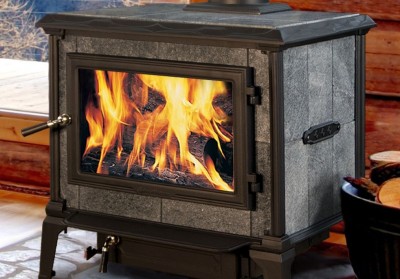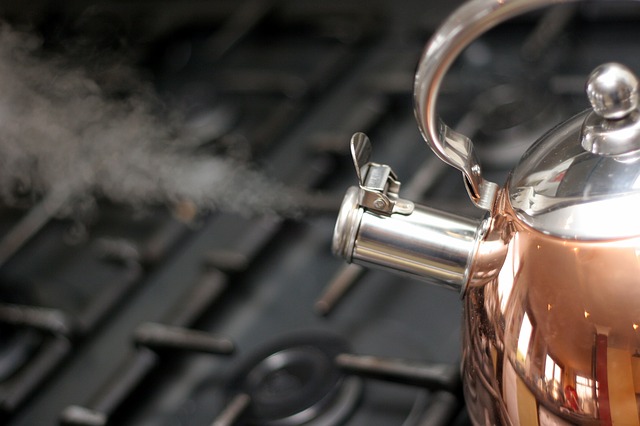I have on many occasions found myself without hot water. Power outages are the usual reason, but when the hot water heater goes out, there’s usually a few days before a new one can be installed. It’s an inconvenience, but little more in that case. But what if we had to go without hot water for weeks or months?
The simplest and perhaps most preliminary solution to producing hot water is to build a fire outside and heat a large pot of water over it. This is quite labor intensive, though, even if it will create hot water. You also can put a large pot of hot water on a wood-burning stove and get the same result. The vapor will add some humidity to the house, which is a good thing since the wood-burning stove is also drying out the air with the heat it produces.
Using a fire or wood stove is a great way to heat a few gallons of water. The issue is when you want 20 to 50 gallons of hot water over the course of a day. That needs some new considerations.
One solution for heating water when you don’t have a traditional hot water tank has been the addition of a 20-gallon water box (reservoir) on the side of a wood-burning cook stove in the kitchen. This is a great multi-purpose solution, as the stove provides heat for the house, heat for cooking and hot water. Unfortunately, it creates a bit of a problem during hot summers.
Get Out Of The Rat-Race And Make Money Off-Grid!
But all of the options for alternative water heating tend to produce radiant heat within the living space. And if it’s 90 degrees outside, you probably don’t want to produce a lot of extra heat. Here’s one solution: You could wait for the coolness of night to heat your water, and insulate the tank for the morning shower or shower right away.
To keep the heat out of their homes, many homesteaders a century ago had an out-building known as a summer kitchen. The idea was that any wood-burning appliances for cooking would be located outside in the summer kitchen, at least during the hot months.
 The summer kitchen was a hot place to work, but it kept the main house cool. It also provided a space for heating water. Often, a galvanized bathtub found its place in the summer kitchen due to its proximity to hot water. Dishes, once dirtied during meals in the main home, would be carried back to the summer kitchen to be washed in the sink. Many people also ate on the porch of the summer kitchen rather than ferrying plates and dishes back and forth for meals.
The summer kitchen was a hot place to work, but it kept the main house cool. It also provided a space for heating water. Often, a galvanized bathtub found its place in the summer kitchen due to its proximity to hot water. Dishes, once dirtied during meals in the main home, would be carried back to the summer kitchen to be washed in the sink. Many people also ate on the porch of the summer kitchen rather than ferrying plates and dishes back and forth for meals.
If you decide to use water that has been heated in a wood-burning cook stove or wood-fired stove, keep in mind it will be hot, hot, hot. In fact, the water is usually very close to the boiling point. There’s a few things you can do to temper the temperature, including adding a cold bucket of water to the top of the tank. But be very careful when tapping this hot water.
A thermometer that measures the water temperature is highly recommended. Some wood-fired cook stoves have this feature. If not, buy one. The recommended safe hot water temperature is 120 degrees Fahrenheit. If you’re above that (and you probably will be), then add cold water or let it cool down a bit.
In addition to stoves, there are water heaters that do not require gas or electricity to work. These also give off radiant heat so the winter/summer dilemma still stands. Most are wood-fired, although alternative burning fuels from peat moss to lower-grade softwoods can be used.
There also is the option on going solar. The best off-grid solution for solar hot water heating is a close-coupled system. This is a roof-top system where the water tank is on the roof above a set of solar panels. The water moves through tubes in the panel and is heated by the sun’s rays.
The benefit of the closed-loop system is that it requires no electric power for pumps. You can hand pump the water into the tank and as the water is heated, it rises into the tank. Gravity provides the water pressure. This system depends on sunlight to function and in extremely cold temperatures, you may find yourself with lukewarm water rather than hot.
There are many options for heating water off-grid. Do your research and ask other off-gridders what they use.
What advice would you add for heating water off-grid? Share it in the section below:
 Off The Grid News Better Ideas For Off The Grid Living
Off The Grid News Better Ideas For Off The Grid Living




